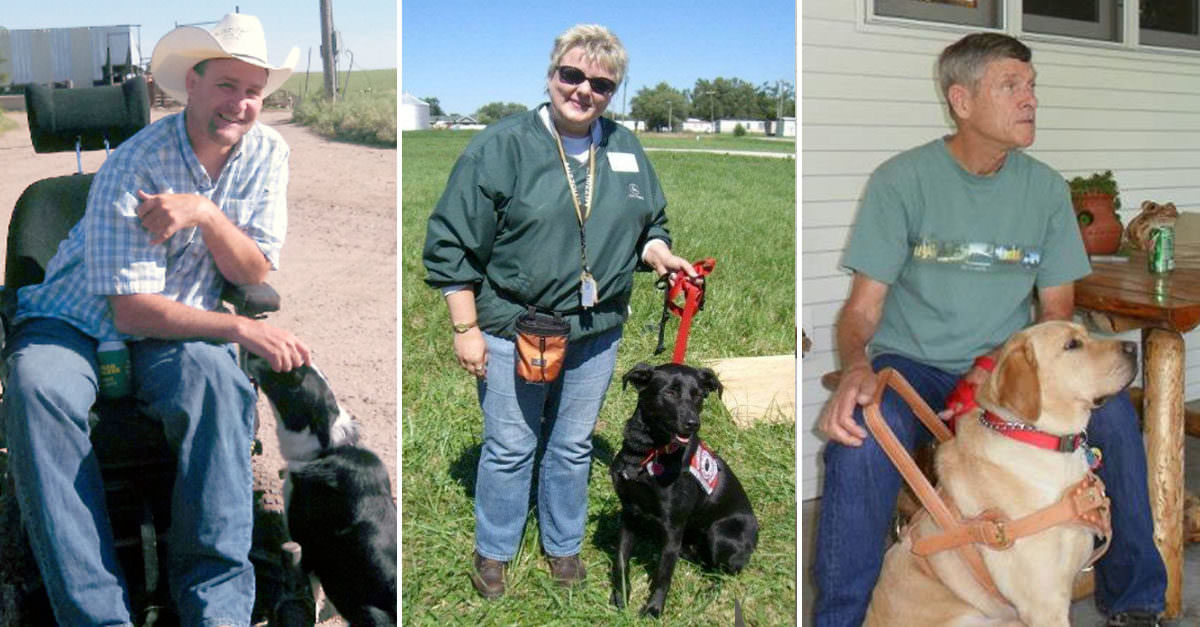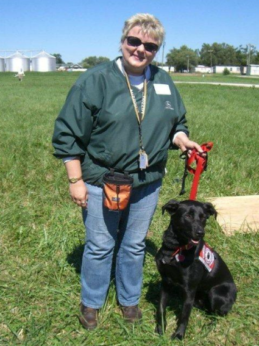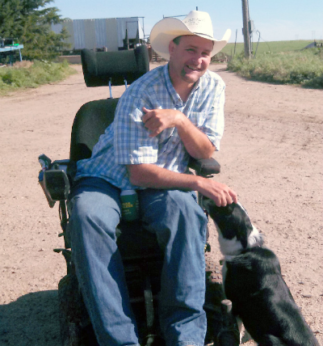This Nonprofit Trains Dogs Specifically to Help Disabled Farmers
The dogs from PHARM Dog USA can obey hand signals, open gates, pick up dropped tools, and more.
This Nonprofit Trains Dogs Specifically to Help Disabled Farmers
The dogs from PHARM Dog USA can obey hand signals, open gates, pick up dropped tools, and more.


Jackie Allenbrand first conceived of PHARM Dog USA – the acronym stands for Pets Helping Agriculture in Rural Missouri, though the company isn’t constrained to the state – in 2005, at a farm show. There she met a farmer with a story: “He had a partial leg amputation, and he was telling me about his Border Collie named Weasel,” says Allenbrand. “He said, ‘I can send Weasel out to get my cattle and all I have to do is sit at the gate and close it behind me, and that really saves me a lot of time.'” Allenbrand, a cattle farmer in northern Missouri, near the Iowa border, suddenly realized that farm dogs had so much more potential. Seven years later, in 2012, Allenbrand started PHARM Dog USA, the only non-profit in the US dedicated to training dogs to assist disabled farmers.
“I always had a knack with dogs,” says Allenbrand. She’s had grown up with the animals and has always had farm dogs as an adult, but it wasn’t until 2005 that the idea for PHARM Dog USA began to crystallize. That year, Allenbrand was working for Missouri University’s chapter of AgrAbility, a USDA program associated with universities all over the country dedicated to coming up with ways to help disabled members of the agricultural community. At first, she ran PHARM Dog USA within AgrAbility, but in 2012, Allenbrand set off on her own and began operating PHARM Dog USA as a standalone nonprofit. (She says this is because only then did she have enough time to dedicate to running the program.)
“Help a dog, help a farmer.”
Allenbrand runs the whole operation, connecting with breeders, trainers, and shelters, and working with clients, most of whom find her through word-of-mouth. She isn’t certified as a trainer, though she certainly helps out when she can. Instead, she’s more of a facilitator.
PHARM’s dogs come in two main categories: herding dogs (usually Border Collies), and service dogs (usually Labradors or Lab-mixes). But off-the-shelf, so to speak, herding and/or service dogs wouldn’t really work for disabled farmers; herding dogs have to be trained to work around specific disabilities, and service dogs have to be trained to work on a farm. That means that, no matter what, PHARM’s dogs are custom-trained for each individual client. It can be expensive and time-consuming – each dog can take up to two years and several thousand dollars to train. But for her farmers, it’s worth it.
PHARM’s Border Collies come from a sympathetic breeder in Plattsburg, Missouri, who donates puppies and even some training for the program. The service dogs largely come from the Greater Dayton Labrador Retriever Rescue shelter in Ohio. The service dogs are trained in basic service skills at the shelter, and then are specially trained by certified trainers to perform the duties needed by each individual client. “Help a dog, help a farmer,” says Allenbrand.

One farmer, Alda Owen, is legally blind. She works with cattle, but was once knocked over by a bull – an incredibly dangerous experience. Now she has a Border Collie named Sweet Baby Jo who’s able to herd to verbal commands like other herding dogs, but is also trained to alert Alda if any cattle come too close to her. Or take Bruce Trammell, who suffered a traumatic brain injury. His lab, Odie, is trained to help Bruce cope with his new lack of balance. Odie, a large dog, knows to stick close to his master and can be a counterbalance if Bruce starts to fall. Odie is also trained to pick up tools, gloves, buckets, and even Bruce’s cell phone – anything he points a laser-pointer at.
These tasks aren’t necessarily that far removed from what other service and farm dogs can do; PHARM doesn’t have any magical abilities to train a Labrador retriever to operate a threshing machine. But set up as a non-profit, specifically targeting farmers, sets the company apart. Many farmers are notoriously unwilling to seek assistance like therapy and counseling; this is one of the reasons for the industry’s high suicide rates. But as a farmer herself, Allenbrand has come up with a non-threatening way to help those who need it. After all, many farmers are perfectly used to having a farm dog. So why not get one who’s specially trained to help in other ways, too?
For more information on PHARM Dog USA, or to donate, visit pharmdog.org.
Follow us

This work is licensed under a Creative Commons Attribution-NoDerivatives 4.0 International License.
Want to republish a Modern Farmer story?
We are happy for Modern Farmer stories to be shared, and encourage you to republish our articles for your audience. When doing so, we ask that you follow these guidelines:
Please credit us and our writers
For the author byline, please use “Author Name, Modern Farmer.” At the top of our stories, if on the web, please include this text and link: “This story was originally published by Modern Farmer.”
Please make sure to include a link back to either our home page or the article URL.
At the bottom of the story, please include the following text:
“Modern Farmer is a nonprofit initiative dedicated to raising awareness and catalyzing action at the intersection of food, agriculture, and society. Read more at <link>Modern Farmer</link>.”
Use our widget
We’d like to be able to track our stories, so we ask that if you republish our content, you do so using our widget (located on the left hand side of the article). The HTML code has a built-in tracker that tells us the data and domain where the story was published, as well as view counts.
Check the image requirements
It’s your responsibility to confirm you're licensed to republish images in our articles. Some images, such as those from commercial providers, don't allow their images to be republished without permission or payment. Copyright terms are generally listed in the image caption and attribution. You are welcome to omit our images or substitute with your own. Charts and interactive graphics follow the same rules.
Don’t change too much. Or, ask us first.
Articles must be republished in their entirety. It’s okay to change references to time (“today” to “yesterday”) or location (“Iowa City, IA” to “here”). But please keep everything else the same.
If you feel strongly that a more material edit needs to be made, get in touch with us at [email protected]. We’re happy to discuss it with the original author, but we must have prior approval for changes before publication.
Special cases
Extracts. You may run the first few lines or paragraphs of the article and then say: “Read the full article at Modern Farmer” with a link back to the original article.
Quotes. You may quote authors provided you include a link back to the article URL.
Translations. These require writer approval. To inquire about translation of a Modern Farmer article, contact us at [email protected]
Signed consent / copyright release forms. These are not required, provided you are following these guidelines.
Print. Articles can be republished in print under these same rules, with the exception that you do not need to include the links.
Tag us
When sharing the story on social media, please tag us using the following: - Twitter (@ModFarm) - Facebook (@ModernFarmerMedia) - Instagram (@modfarm)
Use our content respectfully
Modern Farmer is a nonprofit and as such we share our content for free and in good faith in order to reach new audiences. Respectfully,
No selling ads against our stories. It’s okay to put our stories on pages with ads.
Don’t republish our material wholesale, or automatically; you need to select stories to be republished individually.
You have no rights to sell, license, syndicate, or otherwise represent yourself as the authorized owner of our material to any third parties. This means that you cannot actively publish or submit our work for syndication to third party platforms or apps like Apple News or Google News. We understand that publishers cannot fully control when certain third parties automatically summarize or crawl content from publishers’ own sites.
Keep in touch
We want to hear from you if you love Modern Farmer content, have a collaboration idea, or anything else to share. As a nonprofit outlet, we work in service of our community and are always open to comments, feedback, and ideas. Contact us at [email protected].by Dan Nosowitz, Modern Farmer
September 15, 2017
Modern Farmer Weekly
Solutions Hub
Innovations, ideas and inspiration. Actionable solutions for a resilient food system.
ExploreExplore other topics
Share With Us
We want to hear from Modern Farmer readers who have thoughtful commentary, actionable solutions, or helpful ideas to share.
SubmitNecessary cookies are absolutely essential for the website to function properly. This category only includes cookies that ensures basic functionalities and security features of the website. These cookies do not store any personal information.
Any cookies that may not be particularly necessary for the website to function and are used specifically to collect user personal data via analytics, ads, other embedded contents are termed as non-necessary cookies.